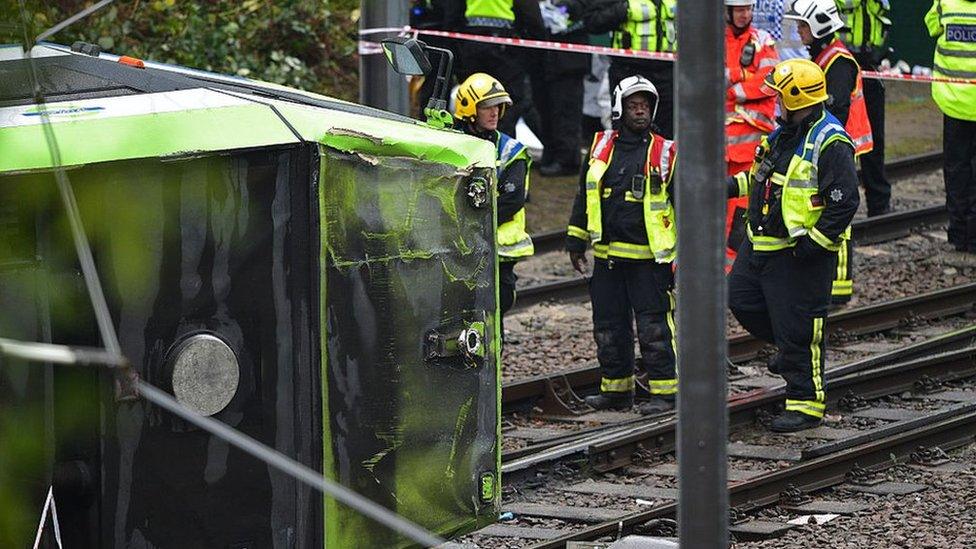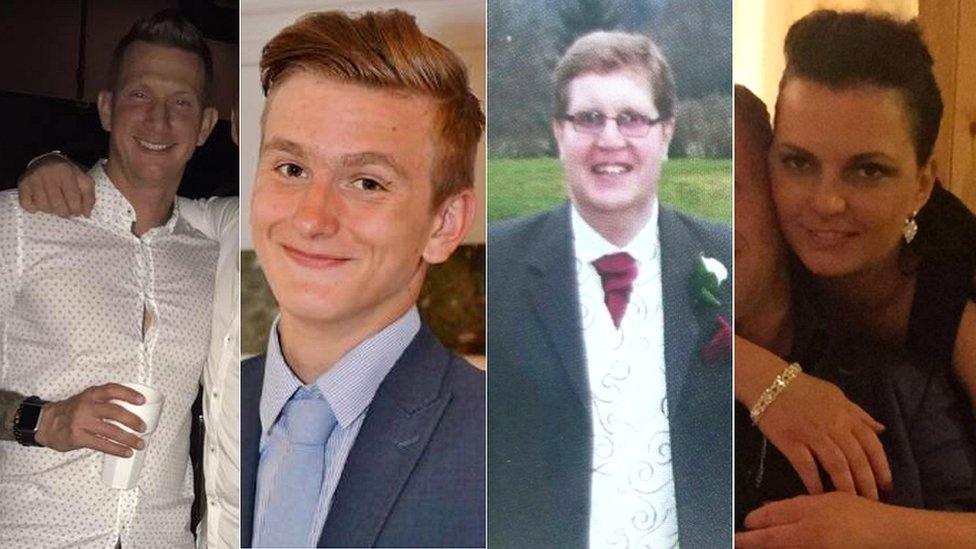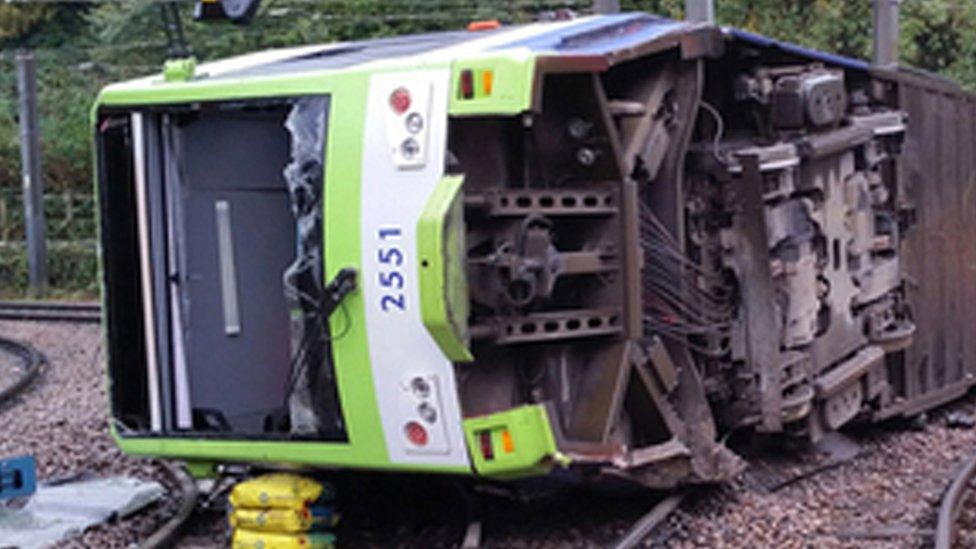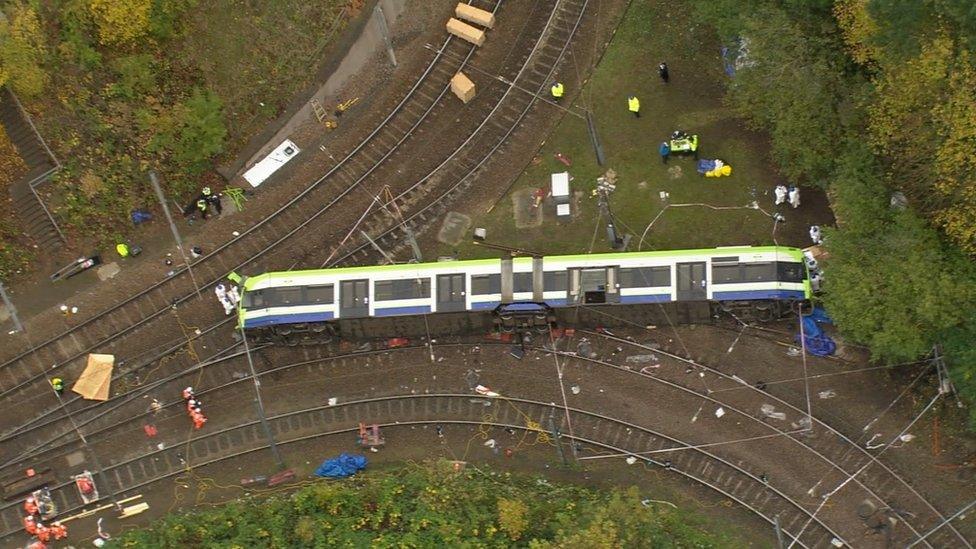Croydon tram crash: Prosecutions launched by rail regulator
- Published

The tram toppled over after hitting a curve at 73km/h (45mph)
The driver of the Croydon tram that crashed killing seven people is being prosecuted by the railway watchdog.
Transport for London (TfL) and the operator, Tram Operations Limited (TOL), are also facing action for breaches of health and safety law, the Office for Road and Rail (ORR) says.
Alfred Dorris was driving the tram when it overturned in November 2016.
The crash was ruled accidental by an inquest jury and TfL paid compensation to victims' families.
The tram was travelling more than three times faster than a speed limit when it tipped over and spun off the tracks near Sandilands tram stop in south London.

Mark Smith, Dane Chinnery, Phil Seary and Dorota Rynkiewicz (l-r) all died in the crash
The crash resulted in the deaths of Dane Chinnery, 19, Philip Logan, 52, Philip Seary, 57, Dorota Rynkiewicz, 35, and Robert Huxley, 63, all from New Addington, and Mark Smith, 35, and Donald Collett, 62, from Croydon.
Sixty-one people were injured in the crash in darkness and heavy rain on 9 November 2016, 19 of them seriously.
Mr Dorris, then aged 42, is accused of "an alleged failure as an employee to take reasonable care of passengers whilst employed at work driving the tram", the ORR said.
If found guilty, he could face a penalty of up to two years imprisonment and an unlimited fine. TfL and ToL could also face an unlimited financial penalty.

Transport for London admitted liability for the crash
Simon French, chief inspector of the Rail Accident Investigation Branch, previously said Mr Dorris may have slipped into a period of "microsleep" before the derailment.
During police interviews, Mr Dorris said he was "confused" but when asked if he had fallen asleep, he replied: "No, no, no."
The driver was arrested at the scene but in October 2019 the Crown Prosecution Service (CPS) said he would not be charged with manslaughter due to a lack of evidence.
The CPS also said corporate manslaughter charges would not be brought against TfL or TOL.
'Welcome news'
Ben Posford, partner at London law firm Osbornes Law, who represented five of the seven families at the inquest, described this as "welcome news" for the families "who have been fighting for years for justice".
Marilyn Logan, 67, whose husband Philip Logan died in the crash, said she had been given "some kind of closure" from the news that prosecutions would be launched, according to her granddaughter Danielle Wynne.
Ms Wynne said: "It has been a horrible five years of feeling so let down, I feel like our families have been forgotten along the way.
Danielle Wynne spoke to the BBC after last July's inquest verdict
"I will be in that courtroom, I will be there however long it takes every step of the way, it's for them, it's justice for our loved ones and I don't want their lives to have been lost for nothing, because that's what it feels like at the moment."
Jean Smith, whose son Mark, 35, died in the crash told the BBC: "It has been a long time coming but it's a step in the right direction.
"I'm happy that there will be accountability where it rightly belongs."

Analysis
By Tom Edwards, BBC London transport correspondent

For the families who lost loved ones this prosecution will be very welcome.
One family this morning told me they were "elated" there might be accountability over what happened because after a safety investigation and an inquest, they felt too many questions had not been answered.
Why had previous incidents of speeding not been reported? Why did it take so long to investigate a similar incident on the same corner just 10 days before?
That was only looked into after the Sandilands crash and it took so long the CCTV from the tram had automatically been wiped.
Why did drivers feel they could not report incidents?
And were fatigue management systems in place and adequate - considering most tram drivers in a survey said they were not?
The inquest heard that over five years, five drivers had been disciplined or sacked for falling asleep but it kept happening.
It seems now those questions will have to be answered in court.
Many of the families had lost faith in the system. It has taken six years to get here.

A spokesperson for TOL said it would "co-operate fully with the legal process", adding: "Our thoughts remain with all those affected by the tragic incident at Sandilands in 2016.
"Our commitment to safety remains unwavering and is integral to everything we do."
TfL said it would "consider those proceedings once we receive them" and "safety will always be our highest priority".
A spokesperson for Mayor of London Sadiq Khan said he would "continue to work with TfL to introduce further measures to help ensure such an awful incident never happens again".
ORR's Chief Inspector of Railways Ian Prosser CBE said: "We've made a fair, independent and objective assessment about what happened, and it is now for the court to consider if any health and safety law has been breached."
A hearing will take place in due course at Croydon Magistrates' Court.

Follow BBC London on Facebook, external, Twitter , externaland Instagram, external. Send your story ideas to hellobbclondon@bbc.co.uk, external
Related topics
- Published22 July 2021

- Published22 July 2021
